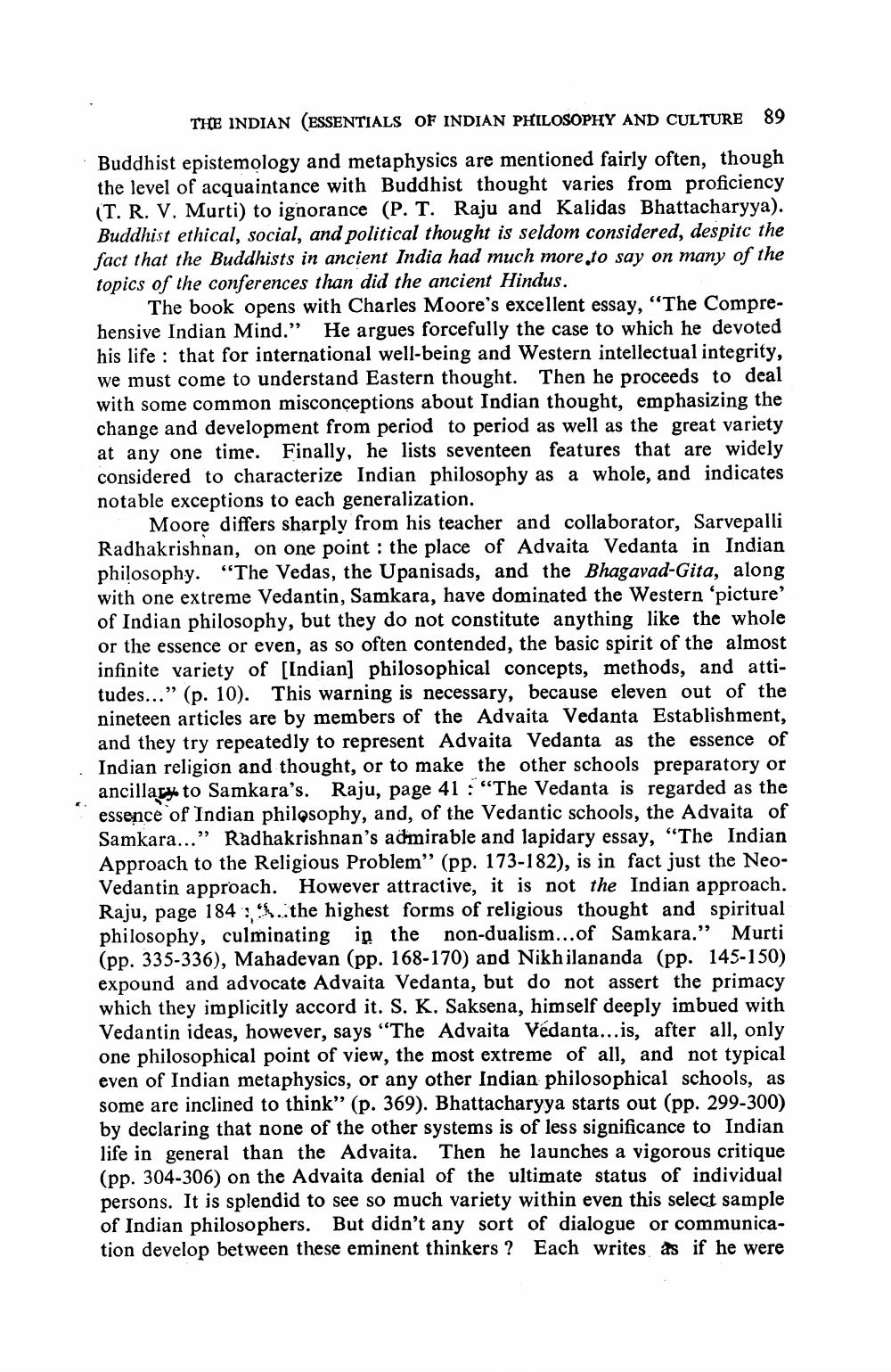Book Title: Indian Mind Essentials Of Indian Philosophy And Culture Author(s): Richard H Robinson Publisher: Richard H Robinson View full book textPage 2
________________ 89 THE INDIAN (ESSENTIALS OF INDIAN PHILOSOPHY AND CULTURE Buddhist epistemology and metaphysics are mentioned fairly often, though the level of acquaintance with Buddhist thought varies from proficiency (T. R. V. Murti) to ignorance (P. T. Raju and Kalidas Bhattacharyya). Buddhist ethical, social, and political thought is seldom considered, despite the fact that the Buddhists in ancient India had much more to say on many of the topics of the conferences than did the ancient Hindus. The book opens with Charles Moore's excellent essay, "The Comprehensive Indian Mind." He argues forcefully the case to which he devoted his life that for international well-being and Western intellectual integrity, we must come to understand Eastern thought. Then he proceeds to deal with some common misconceptions about Indian thought, emphasizing the change and development from period to period as well as the great variety at any one time. Finally, he lists seventeen features that are widely considered to characterize Indian philosophy as a whole, and indicates notable exceptions to each generalization. Moore differs sharply from his teacher and collaborator, Sarvepalli Radhakrishnan, on one point: the place of Advaita Vedanta in Indian philosophy. "The Vedas, the Upanisads, and the Bhagavad-Gita, along with one extreme Vedantin, Samkara, have dominated the Western 'picture' of Indian philosophy, but they do not constitute anything like the whole or the essence or even, as so often contended, the basic spirit of the almost infinite variety of [Indian] philosophical concepts, methods, and attitudes..." (p. 10). This warning is necessary, because eleven out of the nineteen articles are by members of the Advaita Vedanta Establishment, and they try repeatedly to represent Advaita Vedanta as the essence of Indian religion and thought, or to make the other schools preparatory or ancillary to Samkara's. Raju, page 41: "The Vedanta is regarded as the essence of Indian philosophy, and, of the Vedantic schools, the Advaita of Samkara..." Radhakrishnan's admirable and lapidary essay, "The Indian Approach to the Religious Problem" (pp. 173-182), is in fact just the NeoVedantin approach. However attractive, it is not the Indian approach. Raju, page 184..the highest forms of religious thought and spiritual philosophy, culminating in the non-dualism...of Samkara." Murti (pp. 335-336), Mahadevan (pp. 168-170) and Nikhilananda (pp. 145-150) expound and advocate Advaita Vedanta, but do not assert the primacy which they implicitly accord it. S. K. Saksena, himself deeply imbued with Vedantin ideas, however, says "The Advaita Védanta...is, after all, only one philosophical point of view, the most extreme of all, and not typical even of Indian metaphysics, or any other Indian philosophical schools, as some are inclined to think" (p. 369). Bhattacharyya starts out (pp. 299-300) by declaring that none of the other systems is of less significance to Indian life in general than the Advaita. Then he launches a vigorous critique (pp. 304-306) on the Advaita denial of the ultimate status of individual persons. It is splendid to see so much variety within even this select sample of Indian philosophers. But didn't any sort of dialogue or communication develop between these eminent thinkers? Each writes as if he werePage Navigation
1 2 3 4 5 6 7 8 9 10 11
